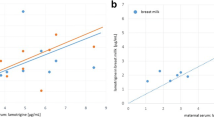Abstract
To examine the extent and clinical sequelae of fetal exposure to zolpidem, a commonly prescribed hypnotic agent. Pregnant women with psychiatric illness participating in a study of psychotropic pharmacokinetics were included. Zolpidem concentrations were analyzed in maternal and umbilical cord plasma collected at delivery. Outcomes were compared between the zolpidem-exposed group and a 1:1 matched comparator group. Forty-five women taking zolpidem during pregnancy were studied. Rates of preterm delivery and low birth weight were 26.7% and 15.6% respectively in the zolpidem-exposed group versus 13.3% and 4.4% in the matched comparator group, but no significant differences were found. The ratio of umbilical cord to maternal plasma zolpidem concentrations in 6 pairs ranged from 0.48 to 2.75. Zolpidem crosses the human placenta and rapidly clears the fetal circulation. Pregnant women with psychiatric illness treated with zolpidem may have less optimal obstetrical outcome, though it is unclear if this was related to the medication.
Similar content being viewed by others
References
Askew J (2007) Zolpidem addiction in a pregnant women with a history of second-trimester bleeding. Pharmacotherapy 27(2):306–308
Da Silva JB, Nakamura MU, Cordeiro JA, Kulay LJ (2005) Acupuncture for insomnia in pregnancy—a prospective, quasi-randomised, controlled study. Acupunct Med 23(2):47–51
Field T, Hernandez-Reif M, Hart S, Theakston H, Schanberg S, Kuhn C (1999) Pregnant women benefit from massage therapy. J Psychosom Obstet Gynaecol 20(1):31–8
Field T, Diego M, Hernandez-Reif M, Figueiredo B, Schanberg S, Kuhn C (2007) Sleep disturbances in depressed pregnant women and their newborns. Infant Behav Dev 30:127–133
Franklin KA, Holmgren PA, Jonsson F, Poromaa N, Stenlund H, Svanborg E (2000) Snoring, pregnancy-induced hypertension, and growth retardation of the fetus. Chest 117:137–141
Lee KA, Gay CL (2004) Sleep in late pregnancy predicts length of labor and type of delivery. Am J Obstet Gynecol 191:2041–2046
Miller EH (2004) Women and insomnia. Clin Cornerstone 6(1B):S6–S18
Physicians Desk Reference (2009) (PDR 61st ed). Thomson, Montvale, pp 2692–2701
Skouteris H, Germano C, Wertheim EH, Paxton SJ, Milgrom J (2008) Sleep quality and depression during pregnancy: a prospective study. J Sleep Res 17(2):217–20
Stowe ZN, Ragan K (2008) ACOG practice bulletin: clinical management guidelines for obstetrician-gynecologists. Bulletin number 92, April 2008. Use of psychiatric medications during pregnancy and lactation. Obstet Gynecol 111(4):1001–1020
Wikner BN, Stiller CO, Bergman U, Asker C, Kallen B (2007) Use of benzodiazepines and benzodiazepine receptor agonists during pregnancy: neonatal outcome and congenital malformations. Pharmacoepidemiol Drug Saf 16:1203–1210
Wilkie G, Shapiro CM (1992) Sleep deprivation and the postnatal blues. J Psychosom Res 36(4):309–16
Wilton LV, Pearce GL, Martin RM, Mackay FJ, Mann RD (1998) The outcomes of pregnancy women exposed to newly marketed drugs in general practice in England. Br J Obstet Gynaecol 105:882–889
Acknowledgments
Supported by NIH grant MH-68036 (to ZNS).
Disclosures
Ms. Juric and Ms. Galanti have received salary support from NIH. Dr. Newport has received research support from Eli Lilly, GlaxoSmithKline (GSK), Janssen, and Wyeth as well as NARSAD and NIH, and speaker’s honoraria from Astra-Zeneca, Eli Lilly, GSK, and Pfizer. Dr. Ritchie has received research support from GSK and has served on advisory boards for CeNeRx Pharma, and Abaxis. Dr. Stowe has received research support from GSK, NIH, and Wyeth, served on advisory boards for Wyeth, BMS and GSK, and received speakers’ honoraria from Eli Lilly, GSK, Pfizer, and Wyeth.
Author information
Authors and Affiliations
Corresponding author
Rights and permissions
About this article
Cite this article
Juric, S., Newport, D.J., Ritchie, J.C. et al. Zolpidem (Ambien®) in pregnancy: placental passage and outcome. Arch Womens Ment Health 12, 441–446 (2009). https://doi.org/10.1007/s00737-009-0100-7
Received:
Accepted:
Published:
Issue Date:
DOI: https://doi.org/10.1007/s00737-009-0100-7



